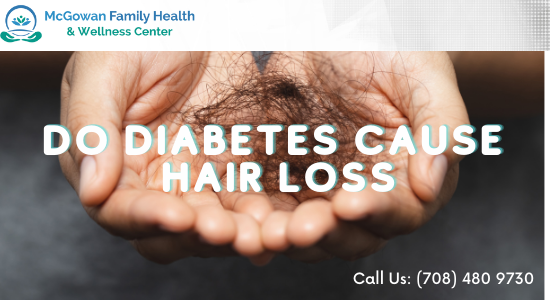If you have diabetes, your body either does not create enough insulin or does not use it well. Insulin is a hormone that transports sugar from your diet into your cells to be stored or used as energy.
When you lack insulin or it is not utilized properly, sugar can accumulate in your blood. Excess sugar can cause damage to organs throughout the body, including the eyes, nerves, and kidneys. Additionally, it can cause harm to your blood vessels. These veins distribute oxygen throughout your body, nourishing your organs and tissues. Damaged blood arteries may be incapable of delivering sufficient oxygen to your hair follicles. This oxygen deficiency can disrupt your natural hair growth cycle.

Diabetes And The Hair Growth Cycle
Hair typically through three stages. Hairs develop at a rate of 1 to 2 cm each month throughout the active growing phase, which lasts two years or longer. The hair then enters a resting period that lasts around 100 days. Following this phase, a portion of the remaining hair falls out.
Diabetes can halt this process, causing your hair to grow more slowly. Diabetes might also result in a greater loss of hair than usual. That hair loss is not limited to the crown of your head. Hair loss can occur in the arms, legs, and other body regions as well. Hair regrows at a slower rate than normal.
Diabetes patients are more prone to suffer from a disorder called alopecia areata. Alopecia is a condition in which the immune system attacks the hair follicles, resulting in patches of hair loss on the head and other body areas.
Diabetes, in and of itself, can result in hair loss. You may also have hair loss as a side effect of stress associated with living with a chronic condition or from diabetic medications. Certain individuals with diabetes also have thyroid illness, which can result in hair loss.
The Initial Stages
Consult your physician if you are experiencing any troubling diabetic symptoms, including hair loss. Hair loss in the arms and legs is particularly important to report since it may indicate inadequate blood supply.
If your hair loss is due to diabetes control, you may need to make changes to your diet, lifestyle, or medication to improve your blood sugar control. Once your diabetes is under control, you should find that your hair loss has decreased. You’ll lose fewer hairs and more of the ones you’ve lost will regenerate. But for better assistance, you should contact a diabetes doctor near me.
What Can I Do to Prevent Further Hair Loss
Here are a few additional tips for maintaining rich, full hair and compensating for diabetes-related hair loss:
Medicine
Your dermatologist may prescribe a topical medication such as minoxidil (Rogaine) for application to the scalp and other areas of hair loss. Men can also regenerate hair using a medication called finasteride (Propecia). Finasteride is not approved for female use. If alopecia is the cause of your hair loss, your doctor may prescribe anti-inflammatory medications.
Biotin
Biotin is a naturally occurring vitamin found in foods such as peanuts, almonds, sweet potatoes, eggs, onions, and oats. Diabetes patients may have lower-than-normal biotin levels.
There is some evidence that oral biotin supplementation may help prevent hair loss. Consult your physician beforehand. Adults should consume 30 micrograms per day, however, supplements typically contain significantly larger levels. Consult your physician to determine the safest dose for you.
While losing your hair can be frightening, you do have options. Daily exercise can help you better regulate your blood sugar. This is an excellent approach to lower blood sugar and increases oxygen flow to the extremities and even the scalp! Consult your physician to learn more about how to manage your hair loss.
How Do You Prevent Hair Loss From Diabetes
Did you know that diabetes can result in a number of other health problems, including premature hair loss? Avoid panic. If you understand how to manage your blood sugar levels, you can also assist reverse the damaging consequences of hair loss.
Hair loss is usually evident when big portions of your scalp do not develop new hair. Continue reading to learn about the connection between diabetes and hair loss, as well as how to manage and prevent it.
1. Ayurvedic Medicine
Ayurveda’s comprehensive treatment of hair loss focuses on balancing the Pitta dosha through a combination of customized lifestyle and diet changes, as well as herbal remedies. A mixture of yoga, breathing exercises, detoxifying oil massage, meditation, herbal remedies, and a healthy diet is indicated to improve the scalp condition.
The following Ayurvedic herbal and natural therapies can help prevent hair loss caused by diabetes:
A. Moringa oleifera
Moringa is high in vitamin C, vitamin A, calcium, potassium, and iron. Ayurvedic practitioners have used its leaves and fruits for millennia to improve vision, alleviate arthritis, and encourage hair growth. Not only can it increase blood circulation in the scalp, but its antioxidants also aid in the battle against free radicals that cause oxidative damage.
Application procedure
- Gently massage moringa oil into your scalp and hair.
- This should be done at least once a week.
B. Helichrysum
Hibiscus, which is high in alpha-hydroxy acids, vitamins C and A, and vital amino acids, helps prevent hair loss and promotes hair growth.
Application procedure
- 100ml of carrier oil, such as coconut or almond oil, should be heated.
- Incorporate hibiscus leaves and flowers into the oil.
- On a low flame, heat the mixture until vapors begin to emerge.
- Filter the liquid and put it in a glass jar.
- For a few minutes, gently massage the oil into your scalp and hair.
- Allow 20 minutes before rinsing with a light herbal shampoo.
C. Fenugreek And Bacopa Monnieri (Bacopa Monnieri) Oil
Brahmi is an efficient local stimulant for treating and managing scalp psoriasis, nausea, and skin eruptions. Methi, or Fenugreek, is a famous herb in Ayurveda for naturally regulating blood sugar levels and promoting hair development.
Fenugreek is an alkaloid-rich herb that contains L-tryptophan, vitamin C, protein, lysine, potassium, iron, and fiber. This effective combination prevents hair loss, stimulates hair growth, delays premature greying, and provides deep conditioning for soft, lustrous hair.
Application procedure
- In coconut or almond oil, combine Methi and Brahmi.
- Allow it to sit for 20 minutes before rinsing with a gentle herbal shampoo for optimal effects.
D. Curry Leaves And Coconut Oil D. Curry Leaves And Coconut Oil
Curry leaves are high in beta-carotene, an antioxidant that helps prevent hair loss, promotes hair development, and repairs and strengthens hair roots.
Application procedure
- Take approximately thirty to forty curry leaves.
- Add the curry leaves to a hot carrier oil such as coconut or almond oil.
- Allow a day for the mixture to cool.
- It should be strained and stored in a glass jar.
- Massage the oil into your scalp and hair gently.
- Allow 20 minutes before rinsing with a gentle herbal shampoo.
E. Oil of E. Amla
For decades, this great source of vitamin C has been used widely in Ayurvedic cures and treatments. Additionally, it contains vital fatty acids that aid in deep conditioning your hair and maintaining healthy hair follicles.
Application procedure
- De-seed 200 gms of fresh amla.
- Dehydrate the fruits and combine them with 500 mL coconut oil. Refrigerate in a glass jar.
- For 15 days, place the glass jar in direct sunshine to allow the mixture to change color.
- The liquid should then be strained and saved for future use.
- Massage this liquid into your scalp and hair for 20 minutes, then rinse thoroughly with a light shampoo.
If you do not have fresh amla fruits, you can substitute amla powder for coconut oil or use amla oil directly.
2. Medications for the Skin
Rogaine, commonly known as Minoxidil, is a popular over-the-counter hair loss medicine. This can be administered directly to areas of hair loss. After visiting a physician, both men and women can take rogaine. It is crucial to follow directions precisely in order to maximize advantages and avoid negative effects.
3. Additional Medications
Propecia, commonly known as Finasteride, is a prescription medication used to treat male pattern baldness in adult men. Typically, a single oral tablet is prescribed daily. The FDA has not approved the medication for use in female patients.
To treat hair loss, healthcare providers may give an oral immunosuppressant such as cyclosporine or methotrexate, a steroid tablet, or steroid injections. Nevertheless, several of these treatments may have undesirable side effects.
4. Changes in Lifestyle
While an active lifestyle may not be able to reverse hair loss, it can significantly enhance blood flow. Regular exercise improves blood circulation throughout your body, including your lower and upper limbs, as well as your hair follicles. Additionally, it may assist you in naturally controlling and managing your blood sugar levels.
Diabetes control requires adhering to a healthy and balanced food plan. Consume lean proteins, fruits, vegetables, and foods high in fiber.
Mcgowan Family Health and Wellness Centre has a wide range of experienced doctors for diabetes so contact Dr. Mcgowan diabetes for the best treatment and get rid of hair loss and sweat that is caused by diabetes. For assistance, you can call us anytime at (708) 480 9730.

